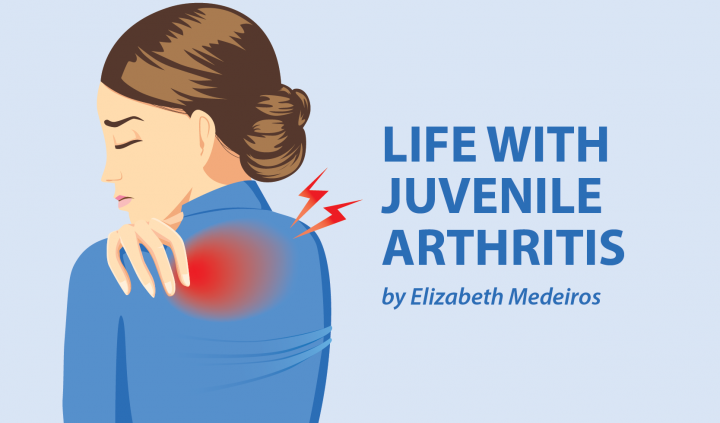From a young age, I liked to draw to express my feelings.
Drawing helped me to communicate how juvenile arthritis was making me feel. The joints on all my little characters were often very pronounced, and sometimes their positions were a bit exaggerated. During a particularly hard time, I drew grotesque skeletons with crumbling spines.

While I’m glad I had this outlet, I didn’t use it to express how I felt until I was a bit older. As a young child, I have no memory of directly expressing pain. Instead, I remember limping around, trying to keep up with my cousins, or just having lazy days because I was so tired and had no will to play.
Unlike older kids with JA, small children don’t have the communication skills necessary to tell you they’re in pain. Instead of saying “Ouch,” they say:
‘I don’t want to play today’
Juvenile arthritis doesn’t only cause swollen, painful joints. It can also bring on fatigue and flu-like symptoms. When those symptoms are bothering your child, they may not feel up to their usual activities. They may want to lie around on the couch watching movies or playing with an iPad.
It’s important to let children rest when they need to and to monitor their condition. Sometimes, increased fatigue can be a sign of an oncoming flare.
‘No!’
Your little one may refuse to use a joint that’s hurting. They may do tasks while favoring a limb, or flat out refuse to follow a command. It’s a good idea to keep an eye on which joint is bothering them and for how long when this happens, and to consider calling the doctor for advice.
‘Oops’
Morning stiffness can make kids extra clumsy. But a kid who is flaring and feeling extra stiff may have more trouble than usual. Having more uh-ohs than usual may be a sign your little one isn’t feeling great.
‘I’m not hungry’
While many young children are picky eaters and aren’t interested in eating, kids with JA may struggle to have an appetite. Flare-ups can sometimes take away their appetite.
It’s a good idea to keep some favorite foods on hand and think of ways to make meals a little more calorie-dense. Peanut butter toast, yogurt with fruit, and cheese and crackers can be filling and packed with some nutrients kids need. It’s essential to let your child’s doctor know about appetite loss so they can recommend vitamins or diets if necessary.
‘I am not cranky’
But yes, they are.
Unless your child’s pain is severe, they probably won’t express how they are feeling by crying. Instead, their discomfort often comes out in the form of being irritable, grumpy, and short-tempered. They may also be overtired from disturbed sleep.
While it’s not pleasant to deal with, it’s also understandable: Being in chronic pain can wear on you after a while, and every little thing can bother you. Mood changes can also be a side effect of prednisone.
Unfortunately, it can sometimes be hard to know when to discipline and when to comfort in this situation. On the one hand, you want to soothe your child. But on the other, they need to know that being demanding or fresh is not OK.
My parents often would let me know when my behavior wasn’t appropriate, and then send me to relax for a bit. When I was small, my mum would often prepare a warm bath to “wash my attitude away.” I think it was a great approach: I learned a lesson while getting the chance to help my body relax.
Read the signs
Your young child may express that they’re not feeling well in many ways. And they may not even say any of these — they might push away a plate or favor a limp while playing completely unfazed. Little kids are very resilient, and every child is unique and has their own way of coping.
Parents, you know your child best. If something seems off and you have a gut feeling, don’t be afraid to contact your child’s doctor. Those little signs can sometimes point to a problem that can be helped!
***
Note: Juvenile Arthritis News is strictly a news and information website about the disease. It does not provide medical advice, diagnosis, or treatment. This content is not intended to be a substitute for professional medical advice, diagnosis, or treatment. Always seek the advice of your physician or other qualified health provider with any questions you may have regarding a medical condition. Never disregard professional medical advice or delay in seeking it because of something you have read on this website. The opinions expressed in this column are not those of Juvenile Arthritis News, or its parent company, BioNews Services, and are intended to spark discussion about issues pertaining to juvenile arthritis.

